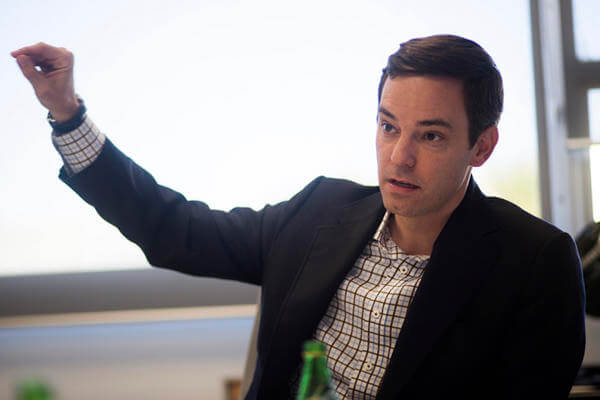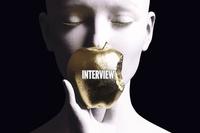BURLINGAME, Calif. -- Ryan Popple figured he was taking the lowest-paying job out of school among his business degree classmates at the College of William & Mary.
Popple was fine with that; he was getting commissioned into the U.S. Army. "I wanted to do some form of national service," he said.
Popple began his four years on active duty as an Abrams tank platoon leader. He deployed during the 2003 invasion of Iraq with the 4th Infantry Division. He spent about a year in the country as a platoon leader and later executive officer planning and escorting vehicle convoys of fuel and supplies.
After graduating from Harvard Business School, Popple eventually came to Silicon Valley and worked at a biofuels startup. He was soon recruited to join an ambitious electric vehicle company called Tesla. It helped launch his career path in green transportation.
Popple, 38, is CEO of Proterra, a manufacturer of electric transit buses. It's a humble calling; there's no Tesla-like "ludicrous mode" on a city bus. Still, the 200-employee company has more than doubled its customer base this year. It sells to transit authorities in nearly 40 cities, including the Santa Clara Valley Transportation Authority.
We spoke with Popple at the Proterra headquarters in Burlingame. The conversation has been lightly edited for length and clarity.
Q.: What about your Army experience led you to where you are now? What were the key lessons?
A.: "The most important thing I learned in the Army was just values around leadership. All of the military services, not just the Army, stress that leadership is a privilege. It's a huge responsibility. You don't do it because it's comfortable or because it's access to some sort of benefit.
"We had a really great culture in our unit. We had little rules in our unit like, you never ate before an enlisted soldier. If you were a platoon leader, and you pulled into an assembly area -- and there was actually hot food -- one of the first lessons we stressed to the new platoon leaders is make sure all of your soldiers have gotten a plate of food, gotten water. If there's anything left, then the last one to eat is the lieutenant, and then the captain eats."
Q.: How did you get to Tesla?
A.: "I was with [a biofuels] company for about nine months, and a recruiter called from Tesla Motors. I was looking at Tesla. I was talking to my wife, Jennifer, about it. The car was on the cover of Vanity Fair. I was telling her it was this crazy idea -- this was the summer of 2007 -- they're making a carbon fiber sports car they run on lithium-ion batteries. She said, "Oh, yeah, I've read about Tesla.
"For an alternative energy company to be on the cover of Vanity Fair, something is going on here."
Q.: You were at the venture capital firm Kleiner Perkins. Is that how you found Proterra?
A.: "The company I most fell in love with after investing in it was Proterra. I served as a board observer for several years and was very active with the company and the board. About 2½ years ago, the company was a little bit stuck.
"It really just couldn't get the gears to start turning. It was a very similar situation to some of the messes that we had in the early days at Tesla. You have technology that works well, but you can't build it at a profit.
"As hard as I was working at Tesla, it's a different hard. We're approaching a point in this market where we have got to grow fast to keep up with the demand that mainly Proterra has enabled. It's not a massive company right now -- it's about 200 people -- but we do a lot of things. We design the vehicle. We manufacture the vehicle. We sell it. We market it. We service it."
Q.: What do you need to do to sell a bus to a transit company? How do you make the argument to a public entity that they have to pay a premium for your product?
A.: "The market that we sell into -- the infrastructure, heavy-duty city bus market -- the [diesel] vehicles are about $450,000. There are natural gas vehicles that are probably $550,000, and hybrids all the way up to $780,000. There's a healthy portion of the market that already buys something cleaner and more efficient than diesel. These vehicles drive enough miles and are so inefficient that you can actually get the fuel payback.
"Your typical city bus goes 40,000 miles per year, and they only get 4 mpg. They need 10,000 gallons of diesel fuel every year. ... Every year, you're looking at $27,000 in fuel. You can achieve a five-year payback.
"It's a really good investment to get an electric vehicle."
Q.: What would be a typical price? What range?
A.: "$749,000 is our base price. We think electric vehicles need to be capable of doing 200 miles confidently per day."
Q.: What do you make of Tesla coming into the market?
A.: "Generally, it's a very good thing. What they describe could be a very efficient feeder system for urban transit systems. I have some concerns about the accessibility of that platform, but you see the same concerns around Uber and Lyft.
"The policy reason that we have transit infrastructure is because all developed countries believe that you should have mobility as a basic economic right. If you take away mobility from someone, you have subjected them to poverty and lack of access to health care, education. If you're going to provide mobility as infrastructure, you've got to be thinking about how you provide it to everyone."
Q.: How can a company like Proterra building EVs address the traffic and congestion problems in Silicon Valley?
A.: "We're probably the only startup that is directly addressing congestion. Transit's major problem is cost. There's not enough funding to go around.
"We reduce the energy cost of a vehicle by about 80%. That can add up to millions of dollars. Ideally, [we] reduce the cost of transit and get more transit on the road. If their budget is relatively fixed, let's enable San Jose to have 600 buses on the road, not 500.
"We need to make transit a much more popular option. One of the ways we do that is very tight integration with services like Uber, like Lyft, maybe Tesla, Apple, Google -- who knows?"
Ryan Popple
- Position: CEO of Proterra, a leading electric bus manufacturer
- Hometown: Elgin, Illinois
- Education: College of William & Mary, Harvard Business School
- Previous jobs: U.S. Army officer. Chevron. Tesla Motors. Investment banker at Kleiner Perkins Caufield & Byers in green growth fund.
- Family: Wife and three children
- Home: Half Moon Bay, Calif.
- Age: 38
5 Things About Ryan Popple
- He was an Eagle Scout.
- He attended college on an ROTC scholarship at the College of William & Mary.
- Popple loves the outdoors and enjoys backpacking and skiing with his children.
- Tesla CEO Elon Musk once reviewed a financial report written by Popple. Musk told Popple that investors would never read its good parts -- because they would throw up before they got through the bad financial news. Musk humorously pretended to wipe vomit from the pages as he explained how to fix it. Popple revised it.
- In business school, Popple wanted to work for a large oil company. He planned to learn about the energy business and find a career path into renewable energy.
Find the Right Veteran Job
Whether you want to polish your resume, find veteran job fairs in your area or connect with employers looking to hire veterans, Military.com can help. Subscribe to Military.com to have job postings, guides and advice, and more delivered directly to your inbox.











